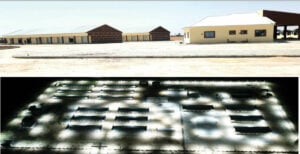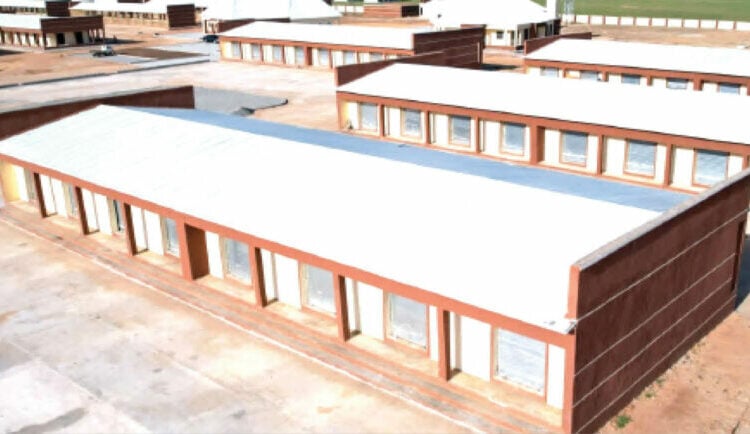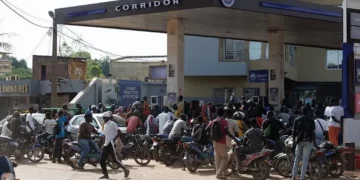In the far-flung stretches of northern Yobe, where the desert wind sweeps across Machina, Geidam and Yunusari, a quiet transformation is beginning to take shape. It is not yet marked by the hum of traders or the chorus of haggling voices, but by the sight of sturdy concrete stalls, fresh iron roofing, and wide open market spaces that stand as symbols of a new dawn.
Governor Mai Mala Buni’s market projects, stretching from the dry northern fringes to the fertile southern plains, are fast becoming the new architecture of economic revival and community hope in a state rebuilding from the ruins of insurgency.
In Yunusari, where the new market has just been completed and awaits commissioning, villagers pass by the site with a mix of wonder and anticipation.
Once, the area’s traders depended on makeshift sheds and open fields vulnerable to the harsh desert wind and seasonal floods, but now, a new market structure sits proudly at the heart of the community. Even before its official opening, it is already the talk of the town.
For residents like 50-year-old Alhaji Bukar, who has traded livestock and potash for more than two decades, the structure represents more than a place of business but, a representation of restored dignity.
“Each time I walk past the new market, I see our future in it,” Bukar said, leaning on his walking stick as he pointed to the new market.

“Before now, we used to travel to Geidam or even across the border to Diffa in Niger Republic to sell our goods or livestock. But now, people will come here. That means more business, more hope for our children.”
The new market in Yunusari is one among several modern markets initiated under Buni’s administration as part of a deliberate effort to stimulate economic growth and post-insurgency recovery.
Alongside those in Ngalda, Machina, and Buni-Yadi, the projects complement earlier ones completed in Gashua, Nguru, and Damaturu, each designed with hundreds of lock-up shops, open stalls, and essential facilities such as water points, loading bays, and storage spaces.
Currently, the Potiskum’s modern market has been completed awaiting commissioning while Geidam’s is moving steadily towards the finish line.
At a glance, these markets might look like simple infrastructure projects, but in Yobe, where economic life has been crippled by over a decade of insecurity, they mean something far deeper.
They represent the promise of renewal, a place where commerce, confidence, and community spirit can find life again.
In Machina, another desert town in the extreme north, the new market is at an advanced stage of completion with traders who depend largely on livestock and sesame trading are counting the days.
“Machina is known for its livestock and sesame,” explained 38-year-old trader, Abba.
“We sell to people from Kano and other places, but during the crisis coupled with poor market infrastructure, everything collapsed. Now, seeing this new market gives me peace. It means the government has not forgotten us.”
His words echo the same sentiment heard across Yobe’s northern belt, an area long defined by resilience amid hardship.
Machina, Yunusari, Geidam, and Gashua lie along the state’s semi-arid and desert zones, rich in livestock, sesame, and potash, but historically underdeveloped in infrastructure.
These new markets are not just concrete spaces, they are foundations for re-linking rural producers to bigger markets and reviving long-broken trade routes.
In Gashua and Nguru, the modern markets have already transformed local business dynamics. Before the new structures were built, traders operated in crowded open-air spaces that offered little comfort or organization. Today, hundreds of shop owners and market women who relocated to the new market, operate under more structured conditions.
For many in Gashua, the change has been almost immediate. “We now have light, water, and order,” said Mallam Adamu, a trader who sells textile materials in the new Gashua market.
“Before now, when it rains, the possibility of our goods being destroyed is always very high, and there was no space to pack trucks. But now, buyers from everywhere can come comfortably and directly to us.”
Governor Buni’s market initiatives reflect a carefully planned vision of balanced economic development that stretches from the desert edges of the north to the greener, livestock-rich southern zones.
In Ngalda where construction has been completed, the anticipation for official opening is palpable while those of Buni-Yadi are also eager to have the newly awarded market project to be completed. Both communities lie in the state’s southern axis, renowned for their abundance of livestock, groundnuts, and diverse farm produce.
Ngalda, located in Fika local government area, has long been a major transit point for farmers and traders moving goods between Gombe and Yobe.
The completion of its modern market has stirred optimism that local farmers will no longer have to travel far to sell their produce.
“I used to take my bulls, goats and groundnuts to Potiskum every week,” said 50-year-old Ajiya Modu.
“The journey was long and costly. Now with this market, buyers will come here. I can make more profit and still have time for my family.”
Similarly, in Buni-Yadi of Gujba local government, a region that once suffered heavily from insurgency, the new market stands as a testament to survival and recovery.
“We lost everything during the crisis. Our homes, our shops, even our roads,” said youth leader, Mohammed Hassan.
“But today, we are rebuilding. This market will help our youths get back to business and reduce unemployment. It’s a sign that peace is not just the absence of war, it’s the presence of opportunity.”
Potiskum, Yobe’s commercial nerve center, has also seen its own share of renewal with a completed market awaiting commissioning.
Long known as the state’s trading hub, especially for livestock and grains, Potiskum’s market has always attracted traders from across the country and even beyond.
The new facility is expected to further strengthen its role as a commercial capital, connecting the north and southern part of the state through a web of trade and transport.
Prof. Ibrahim Umar of the Accounting Department, Yobe State University, said the Governor’s vision goes beyond building markets, it’s about rebuilding the human and economic fabric of the state.
“By linking agriculture, livestock, and local industries through modern marketplaces, the administration is creating an ecosystem where production meets demand, and where trade once again becomes a unifying force among communities previously divided by conflict.
“Indeed, in a state that has endured years of displacement and rebuilding markets means rebuilding livelihoods.”
Across the affected areas, thousands of returnees and internally displaced persons are gradually finding their footing again through commerce and small-scale enterprise.
The markets, once fully operational, are expected to stimulate microfinance activities, empower women traders, and strengthen social cohesion.
In Geidam, where construction is progressing, the sight of workers on-site fills residents with optimism.
“We can see progress every day,” said Fatima Ali, a restaurant operator.
“I may not have a stall yet since it is not completed, but I know this is not only a project for people like me but also for our children and even those yet unborn.”
Governor Buni’s efforts are widely seen as part of his broader post-insurgency recovery blueprint, anchored on rebuilding infrastructure, restoring livelihoods, and reigniting confidence in communities once at the frontline of conflict.
The administration has consistently emphasized that economic recovery must reach every corner of the state, from the arid sands of Machina to the lush fields of Fika.
As the commissioner of Commerce, Industry, Tourism and Solid Minerals, Hon Kaigama Umar, explained,
“These markets are like arteries, when they open, they allow the lifeblood of trade and movement to flow again across the state.”
From the bustling new structures of Nguru and Gashua to the emerging ones in Yunusari, Ngalda, and Machina, the echoes of renewal are unmistakable.
Though some markets are yet to open their gates to traders, their mere presence has already changed the landscape, and the mindset of communities that once felt forgotten.
In Yunusari for example, as the setting sun throws long shadows over the newly built market stalls, a group of young men gather around, talking about what they will sell once the doors open.
Some plan to trade cosmetics, others farm produce including sesame, and a few hope to start food stalls.
It is in these small conversations that the real measure of Buni’s initiative can be felt and the awakening of ambition where there was once despair.
– Yawale, is the Director Information Services, Yobe State Ministry of Home Affairs, Information and Culture





